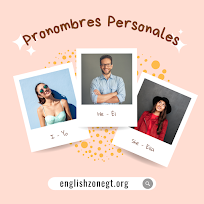
Simple Present - Rules for the third person
Comparte en:
Al igual que en español, en inglés debemos conjugar los verbos según el sujeto. En inglés únicamente modificamos o conjugamos el verbo para las terceras personas (He, She, It). A continuación encontrará 6 reglas comunes para conjugar los verbos para el presente simple.
Rule 1: For most verbs, we add -s to the base form to make the third person singular (he, she, it) form.
- to want - wants
- to sit - sits
- to love - loves
Examples in sentences:
- My grandma loves flowers.
- He wants the new video game.
Rule 2: When the verb ends in -ss, -sh, ch, -x or -zz, we add -es.
- to pass - passes
- to wash - washes
- to watch - watches
- to fix - fixes
Examples in sentences:
- My sister passes all the classes.
- The mechanic fixes many cars.
- The chef washes his hands before cooking.
Rule 3: For verbs ending in "ce, se, ze, and ge", we only add "s" but it's pronounced like a separate syllable.
- to advance - advances
- to close - closes
- to realize - realizes
- to arrange - arranges
Examples in sentences:
- He closes the window when it's cold.
- The teacher arranges the children's books.
Rule 4: When the verb ends in -o, we add -es.
- to go - goes
- to do - does
Examples in sentences:
- My sister goes to the market every Saturday.
- My nephew does his homework every afternoon.
Rule 5: When the verb ends in "a vowel + y" we only add "s"
- to play - plays
- to pay - pays
Examples in sentences:
- The priest prays in the church every day.
- The child plays on the slide every morning.
Rule 6: When the verb ends in "a consonant + y" we change "y" to "i" and add -es.
- to study - studies
- to hurry - hurries
- to accompany - accompanies
Examples in sentences:
- He studies for his exams every night.
- My mom hurries up to prepare breakfast every morning.
Rule 7: Irregular verbs change completely
- to be - am is are
- to have - has
Examples in sentences:
- My friend has many video games.
- She is in the cinema.



